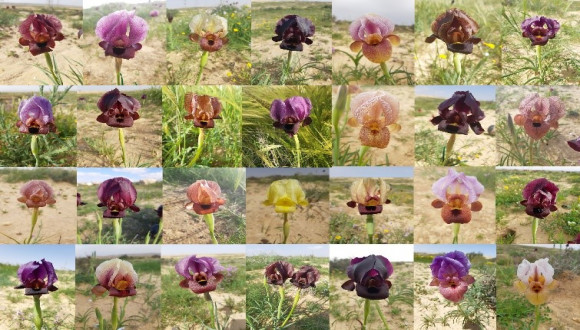Evolution
"Nothing in Biology Makes Sense Except in the Light of Evolution" (Theodosius Dobzhansky, 1973).
Evolution is the major process driving forms and functions of plants, from genomic processes, to behavior, to ecological interactions. In the base of the evolutionary process lies a change in genetic and morphological traits from parents to the offspring, in the short term or along millions of years as species evolve and diverge.
Evolution research in the School of Plant Sciences spans wide range of subjects, including plant behavior and decision making, theoretical and computational biology, molecular evolution and bioinformatics, plant taxonomy, evolutionary ecology, and natural selection in wild and crop plants. Researchers in the school study wide range of plants, from algae and bryophytes, via model plants and crops to wild flowers and it is studies in the laboratory, in the botanical garden, and in nature.
Researchers in this field:
Prof. Itay Mayrose
The lab of Prof. Itay Mayrose specializes in computational biology and bioinformatics, with an emphasis on plant evolution and genomics. We use computational tools to gain insights into the fascinating evolutionary dynamics of plant genomes. In this process, we develop novel computational tools based on machine learning, reinforcement learning, and advanced probabilistic evolutionary models. Current projects in the lab include: (1) Whole genome duplications (polyploidy): Studying the consequences of whole genome duplications on patterns of lineage diversification, biogeography, and the effects of polyploidy on evolutionary patterns at the molecular and genomic levels. (2) Genome editing: We develop novel tools and algorithms for the optimal design of genome editing experiments and how to apply them in a large-scale manner, with special emphasis on crop improvement. (3) Phylogenetics: We develop machine learning methods for more accurate inference of phylogenetic trees and evolutionary genomic analyses.
Lab Website: https://www.tau.ac.il/~itaymay/index.html
Dr. Yuval Sapir
The Plant Evolutionary Ecology laboratory is studying the genetics and adaption of plants to their environment. We use ecological and genetic tools to understand the evolutionary mechanisms of plants adaptation. We study the role of pollinators and abiotic stresses as selection agents that shape flowers, as well as the effect of climate changes on plant adaptations and conservation. We use and perform ecological experimental design in controlled and natural conditions, fitness measurements and natural selection analyses, pollination biology – observations and experiments, genetic basis of flower colour, and gene expression in flower development.
Lab Website: https://labsapir.wixsite.com/labsapir
Dr. Yasmine Meroz
The lab studies computational and behavioral processes in plants; how plants process sensory information about the environment in order to shape their growth morphology. We study processes such as active sensing, decision-making, memory phenomena, and interaction between plants. Our research combines both theory and experiment. As part of our experiments we design and build tailored experimental setups with the aim of interrogating how plants integrate sensory information over space and time, with an image analysis pipeline. Experiments are generally informed by predictions of mathematical models and numerical frameworks, including 3D simulations of plant growth (tropisms and circumnutations), concepts from control theory and physics, the interplay with mechanics, and cost-benefit models.
Lab Website: https://www.merozlab.com/
Prof. Lilach Hadany
Our lab investigates open questions in the theory of evolution, and plant bioacoustics.
Evolutionary theory projects include the evolution of genetic variation, social behavior, host-microbiome interactions, language, and aging.
Plant bioacoustics projects include plant sound emission, interpretation of plant sounds, and plant responses to the sounds of animals and plants.
Lab capabilities: Mathematical modeling of evolutionary processes; plant recording; analysis of plant sounds
Services to the industry: none
Lab Website: https://www.hadanylab.com/
Dr. Michal Gruntman
In the Plant Ecology and Evolution lab, we study varying aspects of plant responses to their environment. We seek to learn the plastic responses and decisions plants make under changing environmental conditions, how plants evolve in response to these changes and the way these responses can be applied to deal with environmental issues, such as invasive species, heavy-metals, and light pollution. We perform controlled common-garden experiments using wild plants with varying evolutionary backgrounds, model species and invasive plants, to answer fundamental questions in ecology and evolution. We phenotype plant responses to environmental stresses, monitor plant movement and their pollinator visitations, analyse belowground root growth using specialized pots and root image analysis, and simulate plant light regimes with automatically light-controlled systems.
Lab Website: https://michalgruntman.wixsite.com/plantecol
Prof. Nir Ohad
The Ohad group is studying the role of plant epigenetics during reproduction, embryogenesis, and development from the seedling stage to adulthood. To understand these epigenetic mechanisms, we have been using Arabidopsis thaliana as a model for flowering plants and the moss Pyscomitrium patens, serving as a model for early terrestrial plants. To study the effects of environmental conditions on reproduction and dispersal strategies we use the mixed mating plant Lamium amplexicaule. In our studies we employ genetic, physiological, morphological, and theoretical tools along with molecular genetics, and biochemical tools including gene knockout, genome-wide methylation analysis, and transcriptomics.
Lab Website: https://en-lifesci.tau.ac.il/profile/niro



.png)

